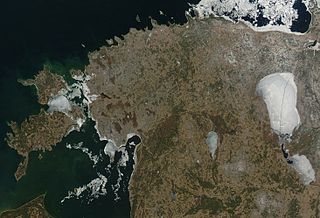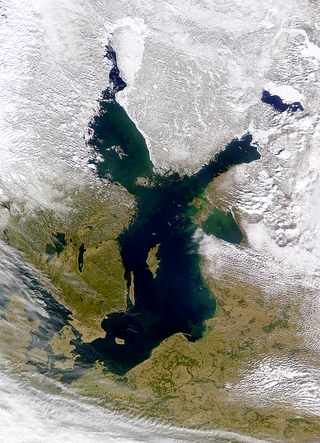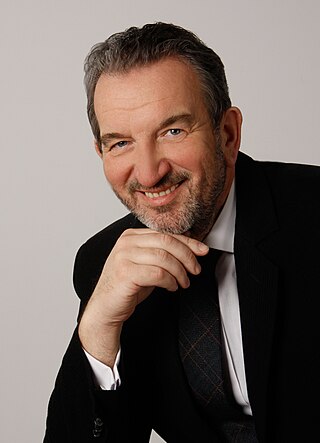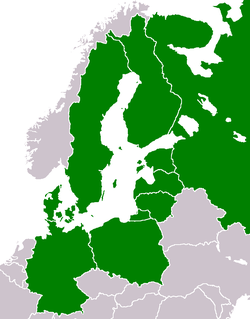
The Baltic Sea is an arm of the Atlantic Ocean that is enclosed by Denmark, Estonia, Finland, Germany, Latvia, Lithuania, Poland, Russia, Sweden and the North and Central European Plain.

Between 57.3 and 59.5 latitude and 21.5 and 28.1 longitude, Estonia lies on the eastern coast of the Baltic Sea on the level northwestern part of the rising East European Platform. Estonia's continental mainland is bordered to the north by the Gulf of Finland across from Finland, to the east by Lake Peipus and Russia, and to the south by Latvia. Besides the part of the European continent, Estonian territory also includes the larger islands of Saaremaa and Hiiumaa, and over 2,200 other islands and islets in the Baltic Sea, off the western and northern shores of the country's mainland.

The Council of the Baltic Sea States (CBSS) is a regional intergovernmental organisation working on three priority areas:
The International Council for the Exploration of the Sea is a regional fishery advisory body and the world's oldest intergovernmental science organization. ICES is headquartered in Copenhagen, Denmark, where its multinational secretariat staff of 51 provide scientific, administrative and secretarial support to the ICES community. It was established on July 22, 1902, in Copenhagen.

The terms international waters or transboundary waters apply where any of the following types of bodies of water transcend international boundaries: oceans, large marine ecosystems, enclosed or semi-enclosed regional seas and estuaries, rivers, lakes, groundwater systems (aquifers), and wetlands.

Agreement on the Conservation of Small Cetaceans of the Baltic, North East Atlantic, Irish and North Seas, often abbreviated to ASCOBANS, is a regional agreement on the protection of small cetaceans that was concluded as the Agreement on the Conservation of Small Cetaceans of the Baltic and North Seas under the auspices of the UNEP Convention on Migratory Species, or Bonn Convention, in September 1991 and came into force in March 1994. In February 2008, an extension of the agreement area came into force which changed the name to “Agreement on the Conservation of Small Cetaceans of the Baltic, North East Atlantic, Irish and North Seas”. ASCOBANS covers all species of toothed whales (Odontoceti) in the Agreement Area, with the exception of the sperm whale.
The Swedish Baltic Sea Water Award was a regional award by the Swedish Ministry for Foreign Affairs now discontinued. It had been administrated by Stockholm International Water Institute (SIWI) till 2010 and later handed over to the Swedish Institute (SI). Established in 1999 by the Swedish Ministry for Foreign Affairs, the award recognised direct and practical efforts by individuals, corporations, non-governmental organisations and municipalities to help improve the water environment of the Baltic Sea. Currently Swedish Institute operates "Cooperation in the Baltic Sea region" by providing Swedish organisations with funding, useful advice and help in finding partners in collaborating countries.
Framework Convention for the Protection of the Marine Environment of the Caspian Sea is a regional convention signed by the official representatives of the five littoral Caspian states: Azerbaijan, Iran, Kazakhstan, Russian Federation and Turkmenistan in Tehran (Iran) on 4 November 2003. The Framework Convention, also called Tehran Convention, entered into force on 12 August 2006.

Coregonus maraena, referred to in English as the maraene, maraena whitefish or the whitefish, is a whitefish of the family Salmonidae that occurs in the Baltic Sea basin - in the sea itself and the inflowing rivers, and in several lakes as landlocked populations. It is found in Denmark, Estonia, Finland, Germany, Latvia, Lithuania, Netherlands, Norway, Poland, Slovakia, Russia and Sweden. As of 2013, it has been listed as a vulnerable species by the IUCN and as endangered by HELCOM. It is an extremely important fish within the Baltic Sea ecosystem, both for population equilibrium and for the local diets of the surrounding human population. Due to a variety of factors, mostly overfishing, the maraena’s population dwindled to near-extinction levels. Thus, rampant repopulation was enacted to preserve this important fish.

Arctic cooperation and politics are partially coordinated via the Arctic Council, composed of the eight Arctic nations: the United States, Canada, Iceland, Norway, Sweden, Finland, Russia, and Denmark with Greenland and the Faroe Islands. The dominant governmental power in Arctic policy resides within the executive offices, legislative bodies, and implementing agencies of the eight Arctic nations, and to a lesser extent other nations, such as United Kingdom, Germany, European Union and China. NGOs and academia play a large part in Arctic policy. Also important are intergovernmental bodies such as the United Nations and NATO.
Baltic Compass is a transnational project which aims to reinforce connection between landuse, environment and agriculture, leading to healthier ecosystems and a more competitive Baltic Sea region. The name Baltic Compass comes from the letters from the whole name of the project: Comprehensive Policy Actions and Investments in Sustainable Solutions in Agriculture in the Baltic Sea Region.
The Protection of the Arctic Marine Environment Working Group (PAME) is one of six working groups encompassed by the Arctic Council. Founded as part of the 1991 Arctic Environmental Protection Strategy, it assimilated into the structure of the Council following the signing of the 1996 Ottawa Declaration by the eight Arctic states. The group compiles representatives from each state, as well as its Permanent Participants representing the region's indigenous populations, and a number of observers. The Working Group claims to operate across the domains of Arctic shipping, maritime pollution, marine protected areas, ecosystem approaches to management, resource exploitation and development, and associations with the marine environment. Where necessary, it is tasked with producing guidelines and recommendations for policy improvement, with projects approved every two years by the council. The Secretariat for PAME is located in Akureyri, Iceland.

Convention on the Protection of the Marine Environment of the Baltic Sea Area, 1992 is an international convention encompassing various measures for the prevention and elimination of pollution of the Baltic Sea. The convention is implemented by the Helsinki Commission (HELCOM).

The UK Joint Expeditionary Force (JEF) is a United Kingdom-led expeditionary force which consists of Denmark, Finland, Estonia, Iceland, Latvia, Lithuania, the Netherlands, Sweden, and Norway. Nine of the countries are also members of NATO, with Sweden currently outside that alliance as their application is pending ratification.
Institute for Environmental Solutions (IES) is a non-profit research organization in Latvia that utilizes airborne remote sensing technologies and creates multidisciplinary teams to design and develop innovative environmental solutions. IES is a network-based organization which brings together scientists, artists, engineers and specialists from Latvia and abroad.

The Baltic Sea Parliamentary Conference (BSPC) was established in 1991 as a forum for political dialogue between parliamentarians from the Baltic Sea Region. BSPC aims at raising awareness and opinion on issues of current political interest and relevance for the Baltic Sea Region. It promotes and drives various initiatives and efforts to support a sustainable environmental, social and economic development of the Baltic Sea Region. It strives at enhancing the visibility of the Baltic Sea Region and its issues in a wider European context.

Mieczyslaw Stefan Ostojski was the second vice-president of the World Meteorological Organization and former director general of the Polish Institute of Meteorology and Water Management.

International Dialogues on Underwater Munitions (IDUM) is a non-governmental organization (NGO) founded in Canada in 2004, and established as a Dutch Foundation in The Hague, The Netherlands in 2014. The IDUM was founded by Terrance P. Long CPSM.SSM. CD., a retired Canadian Military Engineer with more than thirty years experience having served in Explosive Ordnance Disposal (EOD) Centre Chief, and demining expert all over the world. His expertise and passion for marine ecosystems led to the birth of IDUM.












